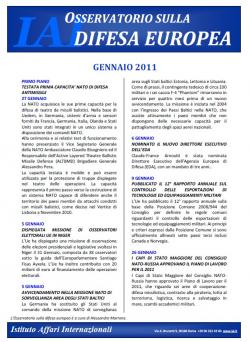Observatory on European defence, May 2000

May 11, 2000
First Meeting of the ESDP Provisional Military Organ
The Provisional Military Organ met in Brussels for the first operational meeting of the Chiefs of Staff. The precursor of the EU Military Committee is tasked with providing political decision-makers with military opinions and managing future crises.
The body’s operational value has been underlined in relation to achievement of the "Headline goals" established in Helsinki and respect for the deadlines set.
May 15, 2000
WEAG Defence Ministers meeting – relations between WEAG-ESDP and Enlargement
The Ministers of Defence of the countries belonging to the Western European Armament Group (WEAG) met in Porto prior to the WEU Council of Ministers meeting.
Various countries have asked for admission to the Group and it has been proposed that the body continue to function autonomously after the WEU is absorbed into the EU.
The WEAG is the WEU body for cooperation in the field of armaments and currently has 13 members, of which 11 belong to the EU (Belgium, Denmark, France, Germany, Greece, Italy, Luxembourg, Netherlands, Portugal, Spain and the United Kingdom), as well as Norway and Turkey. Poland, the Czech Republic and Hungary, the new members of NATO, which are to become full members also attended the meeting for the first time. It is presumed that Austria, Finland and Sweden will soon become members of the WEAG.
Enlgargement to WEU observers and associates has finally solved the problem of the differences in geographic scope of the two organisations and makes it possible to manage the respective ministerial meetings more homogeneously. On the other hand, having postponed the definitive decision on the future of the WEAG and the linkage to be created between its activities and the initiatives under way in the framework of the European Union, the decision was, in fact, inevitable. In any case, the problem of how to involve Turkey and Norway, two non-EU members, in the much hoped for transfer of competences from the WEAG to the EU remains open. This obstacle could slow down the European defence integration process, forcing it to continue on two different planes that are largely uncoordinated.
May 15-16, 2000
WEU Council of Ministers meeting– future of the WEU
Debate at the biannual meeting of WEU defence and foreign ministers of WEU countries, held in Oporto, centred on the ways in which the activities of the organisation will be absorbed into the EuropeanUnion’s common foreign and security policy (CFSP).
The WEU has put its facilities, including the Torrejon Satellite Centre and the Institute for Strategic Studies in Paris, at the EU’s disposal, but exactly how they are to be transferred in 2001 has not yet been defined.
The WEAG will continue to work autonomously (see relative piece).
The meeting represents an inevitable step in the process of redefining European security organisations arrangement: the integration of the WEU’s structures and experience into CFSP offers the latter a much needed contribution in terms of both concrete and theoretical (especially in terms of ability to work out military policies) contribution.
There are still doubts as to the organisation’s role as concerns the collective defence provided for in Article V of the WEU Treaty; resolving this controversial point calls for a definition of relations between European organisations and NATO.
May 24-25, 2000
NAC, NATO Foreign Ministers meeting –ESDP-NATO relations
Participating in the Florence North Atlantic Council meeting of the foreign ministers of the 19 NATO countries were the new Saceur, General Ralston, and the WEU Secretary General and EU High Representative, Xavier Solana. Of the many topics discussed, much time was devoted to the recent developments in ESDP and the need for a coordination between European initiatives and NATO (see points 25-33 of the Final Communiqué).
Repeatedly underlined was the need to involve allied countries not belonging to the WEU in ESDP, avoiding the duplication of structures and creating channels of communication and cooperation between the two organisations. It was hypothesised that NATO-EU relations could develop out of the WEU experience and that the defence capacity initiative (DCI) within NATO could contribute to achieving the EU’s headline goals.
-
Details
Roma, Istituto affari internazionali, 2000 -
Issue
00/05


